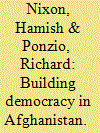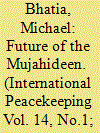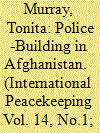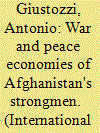| Srl | Item |
| 1 |
ID:
077179


|
|
|
|
|
| Publication |
2007.
|
| Summary/Abstract |
This article focuses on the role of international aid donors in Afghanistan since the signing of the Bonn Agreement in 2001. Specifically, it explores the scope and utility of peace conditionalities as an instrument for peace consolidation in the context of a fragile war-to-peace transition. Geo-strategic and institutional concerns have generally led to an unconditional approach to assistance by international actors. It is argued that large inflows of unconditional aid risk re-creating the structural conditions that led to the outbreak of conflict. Aid conditionalities need to be re-conceptualized as aid-for-peace bargains rather than as bribes for security. Some forms of conditionality are necessary in order to rebuild the social contract in Afghanistan. This finding has wider relevance for aid donors and they should reconsider orthodox development models in 'fragile state' settings. Rather than seeing conditionalities and ownership as two ends of a policy spectrum, the former may be a necessary instrument for achieving the latter
|
|
|
|
|
|
|
|
|
|
|
|
|
|
|
|
| 2 |
ID:
077178


|
|
|
| 3 |
ID:
077177


|
|
|
|
|
| Publication |
2007.
|
| Summary/Abstract |
Abstract Following the four-year Bonn Agreement implementation period, from December 2001 to December 2005, the London Conference on Afghanistan was convened, 31 January-1 February, to reaffirm the commitment of world leaders to the next phase of statebuilding and reform in Afghanistan. The central document of this gathering, the Afghanistan Compact, sets forth a number of time-bound benchmarks for the next five years in the areas of security, governance and development. This article examines key aspects of the compact and what will be required for the government of Afghanistan to meet the various targets, along with the support of the international community. Policy recommendations are further advanced to facilitate reconstruction efforts and to sustain a sufficient level of international engagement to avert failure in Afghanistan
|
|
|
|
|
|
|
|
|
|
|
|
|
|
|
|
| 4 |
ID:
077182


|
|
|
|
|
| Publication |
2007.
|
| Summary/Abstract |
Contemporary Afghan politics is marked by a debate over the 'mujahideen.' This contest involves the mythologizing, demythologizing and appropriation of the term by a wide variety of actors, from warlords, tribal combatants, the Taliban and Anti-Coalition Forces to rights activists and journalists. This struggle is a competition for legitimacy over the 'right to rule' and the 'right to conduct violence'; and it is critical to understanding the dilemmas of statebuilding in Afghanistan. Through such an examination, policy lessons are acquired concerning the role of the Afghan government and members of the international community in confronting armed groups
|
|
|
|
|
|
|
|
|
|
|
|
|
|
|
|
| 5 |
ID:
077183


|
|
|
|
|
| Publication |
2007.
|
| Summary/Abstract |
Despite considerable effort and large sums of money spent over five years of police reform in Afghanistan, the investment has yet to yield significant results. Among the reasons outlined in this article are the failure to distinguish clearly between the different roles of the police and the military in contributing to security sector reform; a lack of strategic vision and effective planning; and a failure to capitalize on the insights, best practices and lessons learned from the last 30 years of police reform in the West. Finally, recommendations are made for remedying current problems and re-directing reform to achieve greater effectiveness
|
|
|
|
|
|
|
|
|
|
|
|
|
|
|
|
| 6 |
ID:
077184


|
|
|
| 7 |
ID:
080930


|
|
|
| 8 |
ID:
077180


|
|
|
|
|
| Publication |
2007.
|
| Summary/Abstract |
This essay explores the interdependence between statebuilding, narcotics and conflict through an analysis of interviews and a survey conducted, in the spring of 2005, in the Laghman and Nangarhar provinces of Afghanistan. Rural Afghanistan is characterized by weak conflict-processing mechanisms, combined with a high propensity towards the escalation of violence. State-sponsored institutions for conflict processing hardly exist, and donor attempts to prop up traditional institutions, such as the village shura, as a substitute for local government have failed to produce tangible results. Farmers widely acknowledge the benefits of opium as one of the few available cash crops. As a result, competition over scarce land and propensity for violence are affected indirectly by the drug economy. The study concludes with a criticism of current poppy eradication efforts. Under an informal 'eradication contract', provincial leaders are induced to comply with the request of the central government to reduce opium cultivation, in exchange for increased political autonomy and the promise of donor funds.
|
|
|
|
|
|
|
|
|
|
|
|
|
|
|
|
| 9 |
ID:
077181


|
|
|
|
|
| Publication |
2007.
|
| Summary/Abstract |
Afghanistan's war economy started taking its current shape after 1992, when the main politico-military actors had to find alternative sources of revenue, having been dropped by their international sponsors. The same actors integrated into the 'peace economy' following the official end to the war in 2001, in a process which resembles the formation of 'mafia' networks, in which the narcotics trade appears to play an important role. If the central government turns out to be too corrupt and uncommitted to address the issue, the international community might one day have to directly engage these actors in order to facilitate their evolution from 'robber barons' to legitimate magnates
|
|
|
|
|
|
|
|
|
|
|
|
|
|
|
|